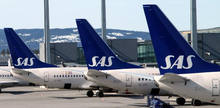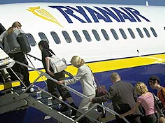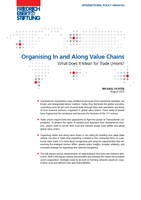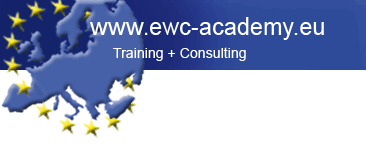 |
20
October 2015
|
|
Welcome to issue no. 3 / 2015 of EWC News.
|
|
The Academy for European Works Councils (EWC Academy) is there to inform you about the activities of European Works Councils and related subjects.
EWC News appears four times a year. You can find past issues in the newsletter archives.
You can download this newsletter as a pdf file and print it out.
|
|
1.
New
industrial relations in France and Luxembourg
|
|
A whole package of legal regulations came into force in France on 19 August 2015 which substantially modifies both labour relations as well as participation rights on supervisory boards. The social dialogue and employment bill or "loi Rebsamen", named after François Rebsamen (photo) who was the socialist employment minister until recently, aims at modernizing labour relations. According to the government, French labour relations are marked by complex and rigid regulations and a "culture of mistrust".
At first negotiations were planned to allow the social partners to mutually agree on the contents of legislation. These broke down however on 25 January 2015 and the government subsequently released its own bill. The legislation is an important part of their reform program for relaunching the economy and for reducing unemployment, which, at nearly 11%, is more than twice as high as in Germany. Changes to works council consultation procedures had already come into force on 1 January 2014 for restructuring matters (see report in EWC News 1/2014).
Lots of supervisory boards with employee representatives in the future
In France, companies have only been legally obliged to integrate employee representatives with full voting rights on administrative or supervisory boards since June 2013. The threshold was set however very high: codetermination applied only to companies starting from 5,000 employees in France or to those with more than 10,000 world-wide (see report in EWC News 2/2013). Prior to 2013 there had only been codetermination in public or formerly state-owned companies. The new legislation lowers the threshold down to 1,000 employees in France (or 5,000 world-wide). The number of companies covered by codetermination (so far about 200) has therefore considerably risen. The number of employee representatives will also increase although they are not allowed to exercise a works council mandate at the same time.
Reform of works council structures
Up to now, in French companies, there have been three representative bodies operating in parallel: the personnel delegates, the works council and the safety and hygiene committee. In the future, in companies with under 300 employees, these three bodies are to be combined into one and also on a voluntary basis in larger companies. The works council consultation rights have also been simplified. So far there have been 17 compulsory consultations per year, based on 50 different legal regulations. These have now been merged into a dedicated chapter of the labour code and are restricted to three core topics:
The works council is still chaired by the employer. For internal discussion similar to German works council meetings, the employee side always meets for preliminary briefings. French works council meetings have a strong legal character. The employer must be able to prove that the consultation procedure has been correctly carried out. Otherwise the implementation of any measures can be stopped through court action. In the future meetings may also be organized as video conferences and employers may record them. This also applies to central and group works councils as well as to European works councils under French jurisdiction.
From a French perspective, consultation has always included a detailed analysis of any subject matter by external experts chosen by the works council. Only subsequently does the works council render its opinion and concludes the consultation. The European Works Council Directive was also based on this philosophy (see report in EWC News 3/2011).
Luxembourg changes from Belgian to German model
The works council ("délégation du personnel") has information and consultation rights which are closely modelled on the text of the new EWC Directive and in addition also codetermination rights on specific topics of personnel and social policy in companies with more than 150 employees. There are representatives responsible for occupational safety and equality and the employer bears the cost of experts chosen by the works council itself. One works council member is completely exempted from work in companies with at least 250 employees and two from 501 employees onwards. A general employee assembly takes place once a year during working hours. Each works council member has a right to leave for training. An arbitration board ("commission de médiation") with a neutral chairperson is provided for the resolution of disputes.
The Christian trade union confederation LCGB criticized the legislation since it transfers tasks for which unions were previously responsible, to the works councils. The social-democratic trade union confederation, OGBL has welcomed the new legislation. The employers' confederation took a negative view. The last works council elections were held in November 2013 in the old legal context. More than 50% of all seats were allotted to non-union candidates (see report in EWC News 4/2013). The following texts are only available in French: Forthcoming event
|
|
2.
Bargaining systems and labour law in further countries
|
|
Under pressure from the Troika, Greece has been experiencing a decline of its collective bargaining system since 2011. Labour legislation standards such as the principle of "favorability" to the employee as well as government's right to declare agreements as generally binding have been completely abolished. Industry-wide collective agreements can hardly be found any longer.
The Syriza government, elected for the first time in January 2015, announced the reconstruction of the Greek collective bargaining system as one of its most important priorities and submitted draft legislation in April 2015. This however failed due to resistance from creditors. In the end though and largely hidden from the public eye they were able to push forward their proposals. The third memorandum with creditors from August 2015 makes provisions for analyzing the development of the collective bargaining system in collaboration with independent experts and international organizations (including the International Labour Organization, ILO) with the goal of accomplishing further reforms which adhere to "EU best practices". Explicitly excluded is a simple "return to the political objectives of the past".
A general strike took place in Finland on 18 September 2015 in protest against cutbacks in the social system and restrictions to collective bargaining. The governing conservative coalition which has been in power since 29 May 2015 in collaboration with a right-wing populist party, wants to reduce annual vacation, limit extra-pay for overtime and Sunday work and generally get rid of the payment for two bank holidays as well as the first day of paid sick leave.
At first the government wanted to conclude a "social pact" with the social partners. This fell through on 21 August 2015 and on 9 September 2015 they unilaterally announced a set of measures to reduce labour costs. In the future collective agreements will no longer regulate minimum but rather maximum terms and conditions. The trade unions see this as an attack on the freedom of coalition. Finland has been in recession for years with rising unemployment, reaching currently 9.7%. |
|
3. Company
policy disputes make headlines
|
|
SAS cabin crew take Swedish trade union to court
The Industrial Court of Denmark passed a ruling on 1 July 2015 concerning recognition of collective bargaining at the Copenhagen airport in the Ryanair case. The low-cost Irish airline had opened its base on 26 March 2015 and has refused to enter into collective bargaining with Danish unions. The reasoning behind this is similar to the one already presented in other countries: all employment contracts in Ryanair come under the jurisdiction of Ireland where the company has its headquarters. In France in October 2013, this attitude had almost led to the confiscation of airplanes by the public prosecutor (see report in EWC News 4/2013).
Following the court ruling the Danish trade union confederation, LO, called for solidarity actions on 18 July 2015. As a result Ryanair would have been excluded from refueling, baggage handling and catering services. Solidarity actions were also announced against Ryanair for 23 July 2015 at the Billund airport in Jutland. Central management consequently decided on 15 July 2015 to completely withdraw from Denmark and fly in the future from Kaunas in Lithuania. Ryanair intends to challenge the court decision before the European Court of Justice in Luxembourg.
Dispute over bargaining unity in British bank
Lloyds Banking Group with 85,000 employees world-wide originated in 2009 following the merger of Lloyds TSB with the Halifax Building Society and the Bank of Scotland. The rivalry between the somewhat more militant LTU and the two TUC trade unions is a direct consequence of this merger, since each union had their bastion in a different bank. There were negotiations for three years on a partnership but with no success. The situation reminds us of the German transport sector where small unions were acting against the DGB affiliated unions. In Germany "derecognition" has only been explicitly made possible since July 2015 by means of the Collective Bargaining Unity Act (see report in EWC News 4/2014). |
|
4. Court rulings on EWC
matters
|
On 21 May 2015 the Versailles appeal court rejected the claim of the European works council of Transdev, a French transport group, to the right for Information and Consultation on the future of the bankrupt Ferry operator SNCM from Marseille. The court, situated in a historical building (photo) near the famous palace, confirmed the first instance ruling of November 2014 (see report in EWC News 4/2014). Since both companies have their headquarters in France and SNCM only represents 2.5% of the Transdev workforce, this is not a transnational matter in the sense of the EWC Directive.
The court furthermore dealt with the question as to who may file a complaint in the name of a European works council. In this case there were 14 representatives (two thirds all EWC members). Central management argued that individual delegates may not go to court in the name of the EWC, since they had been given no authorization to do so. The EWC should have adopted a resolution during a meeting with the majority of its members. The judges however accepted the filing from 14 representatives, since the convening of an extraordinary EWC meeting would require a considerable amount of time and therefore prevent a possible infringement from being resolved in time.
Trade
unions cannot take to court on behalf of EWC
  On
17 July 2015 the district court in the Paris suburb of Nanterre
rejected the injunction filing from two trade unions against mass
redundancies planned at Total. The French oil group plans to cut 180 of
the 430 jobs in the La Mède refinery near Marseille and 180
out of the 580 at the Lindsey Oil Refinery in England, on the North Sea
coast. While the CGT in La Mède went on strike for
altogether 48 days (photo) the majority of the staff and the three
remaining trade unions did not participate. Furthermore the
consultation of the EWC did not proceed as the CGT would have liked. On
17 July 2015 the district court in the Paris suburb of Nanterre
rejected the injunction filing from two trade unions against mass
redundancies planned at Total. The French oil group plans to cut 180 of
the 430 jobs in the La Mède refinery near Marseille and 180
out of the 580 at the Lindsey Oil Refinery in England, on the North Sea
coast. While the CGT in La Mède went on strike for
altogether 48 days (photo) the majority of the staff and the three
remaining trade unions did not participate. Furthermore the
consultation of the EWC did not proceed as the CGT would have liked.Consequently the CGT, together with the British trade union Unite, started legal proceedings against central management. The judges expressly confirmed the trade unions' right to claim for a correct consultation procedure before French courts. However, in this particular case, Total's EWC had been informed in detail about management plans in its last meeting on the basis of documents. So the majority of the EWC did not support the legal action taken by the two trade unions. According to the court, in such a situation trade unions may not substitute themselves for the European works council. Both of the unions must now equally bear the legal expenses of 5,000 €. Total's EWC agreement was last revised in October 2012 and is considered as one of the best in France (see report in EWC News 4/2012).
German EWC legislation before the Federal Labour Court
The legal dispute arose as a result of a plant closure of the Australian packaging group, Amcor in Neumünster (Northern Germany) at the end of 2014 and for which the European works council had not been correctly informed and consulted (see report in EWC News 1/2015). In the end, the courts were only concerned with the conformity of the transposition of the EU Directive into German EWC legislation. In April 2011, there had been a clear decision of the conservative-liberal majority of the German Bundestag, at the time, to set a maximum fine of only 15,000 € for infringement. The former social-democratic opposition were unsuccessful in pushing through an amendment for tougher sanctions (see report in EWC News 1/2011). Many lawyers consider this as a disregard for the provisions of the European legislator. The EWC Directive explicitly requires "sanctions that are effective, dissuasive and proportionate in relation to the seriousness of the offence". This issue will probably be first taken up to the European Court of Justice in Luxembourg before the Federal Labour Court makes a final ruling.
|
|
5. Mergers setting
the EWC
agenda
|
  Demands for no-redundancy
guarantee Demands for no-redundancy
guaranteeThe European works council of the Swiss building materials and adhesive manufacturer, Sika, met at their Bad Urach production site (South Germany) on 23 July 2015. The company with 17,000 employees world-wide and controlled by a family holding is to be sold to the French group, Saint Gobain. In an open letter to Saint Gobain's CEO the EWC demanded guarantees that no jobs will be lost for all sites in the first three years following the acquisition as well as no reductions in wages or site-specific social security benefits. The EWC fears that parts of Sika could be spun-off and sold to compensate for the high cost of the acquisition. The representatives have made it clear that "due to these issues which, for us remain unresolved, we are of the opinion that the best solution for Sika and its employees would be for it to remain an independent Swiss company". Saint Gobain is one of the ten largest French industrial groups with 180,000 employees in 66 countries and has already had a European works council in place since 1988 whose agreement was last updated in May 2009 (see report in EWC News 2/2009). Sika's EWC was established in 1996.
Merger of Coca-Cola bottling companies   The merger of three major European bottling
companies; Coca-Cola Enterprises, Coca-Cola Iberian Partners and
Coca-Cola Erfrischungsgetränke took place on 6 August 2015
creating a new company, Coca Cola European Partners based in London.
The new company has 50 bottling plants in 13 countries with 27,000
employees, of which 9,500 in Germany. The US parent company produces
only concentrates. Bottling is undertaken by independent, partly
public-listed firms, who only use the brand name of Coca-Cola under
license. Coca-Cola Hellenic Bottling for Italy, Austria and Eastern
Europe is not involved in the merger. It is the only company in Europe
with a European works council under Greek law (see report in
EWC News 3/2012). Out of the three companies
involved in the merger, Coca-Cola Enterprises is the only one to have
had a EWC established in 1998 under Belgian jurisdiction. The
establishment of a new European works council is now pending for the
new company under British jurisdiction and covering all 13 countries. The merger of three major European bottling
companies; Coca-Cola Enterprises, Coca-Cola Iberian Partners and
Coca-Cola Erfrischungsgetränke took place on 6 August 2015
creating a new company, Coca Cola European Partners based in London.
The new company has 50 bottling plants in 13 countries with 27,000
employees, of which 9,500 in Germany. The US parent company produces
only concentrates. Bottling is undertaken by independent, partly
public-listed firms, who only use the brand name of Coca-Cola under
license. Coca-Cola Hellenic Bottling for Italy, Austria and Eastern
Europe is not involved in the merger. It is the only company in Europe
with a European works council under Greek law (see report in
EWC News 3/2012). Out of the three companies
involved in the merger, Coca-Cola Enterprises is the only one to have
had a EWC established in 1998 under Belgian jurisdiction. The
establishment of a new European works council is now pending for the
new company under British jurisdiction and covering all 13 countries.Spanish workforce once again makes headlines Since Coca-Cola Iberian Partners had only plants in Spain and Portugal, there had been no initiative for the establishment of a European works council until recently. The conflict around the closure of four bottling plants however gained a lot of attention throughout Europe. In June 2014, the Spanish Supreme Court cancelled the dismissal of 1,190 employees, since a correct consultation procedure had not been carried out with the Spanish works councils (see report in EWC News 2/2014). On 13 July 2015 following further legal disputes, the judges finally ordered the immediate reinstatement of all dismissed employees. The Fuenlabrada plant near Madrid was reopened on 7 September 2015, not as bottling plant, but as a logistics center. This conflict did not only make headlines within the EU and involved the European Parliament. Recently there was even a report in the New York Times which posed the question: Can a Spanish court force a multinational company to bottle Coca-Cola against its own will? Should this issue be taken to the European Court of Justice in Luxembourg, a fundamental question would be up for debate, which also concerns many European works councils: what does a correct consultation procedure consist of and what consequences if central management does not consult correctly?
  European works councils continue
to grope in the dark European works councils continue
to grope in the darkAlthough the merger was already announced in April 2015 and in the meantime most authorizations have already been given, both European works councils have only received the same information as is also available to the press. At a meeting held in Brussels on 11 September 2015 the trade union coordination group for Nokia and Alcatel-Lucent criticized the systematic violation of their Information and Consultation rights. There is neither information on the time-schedule of the merger, nor on the procedure, nor on the expected results especially regarding jobs. The acquisition of the Franco-American IT group Alcatel-Lucent by the Finnish Nokia group is due to be finalized in 2016. The agreement of the French government is still pending. No legal right on consultation Since both European works councils operate on the basis of a "voluntary" agreement dating back to 1996 and before, they are therefore not subject to the EU Directive and depend on the exact wording of their EWC agreements. Although the agreements were revised in the past years, in both cases no specific right to consultation has been included in the sense of the new EU standards. However both councils have already had experience with legal disputes (see report in EWC News 2/2015). |
|
6.
(Re-)Negotiation of EWC agreements
|
|
Full-fledged EWC for Dutch HR service provider
In the future the European works council will meet twice annually at the company headquarters in Diemen near Amsterdam. All representatives have an annual time-off work allowance of five days in addition to the meetings, and the three members of the steering committee seven. Mandates are allocated in exact accordance with the new EU Directive: each country in the European Economic Area is allocated at least one seat for every 10% of the European workforce (or fraction thereof). A further two seats are allocated to external union representatives and if necessary experts may also being called in. Randstad is the second largest Human Resources service provider in the world with 28,000 employees in 39 countries..
Belgian chemicals group clarifies consultation procedure
A "Charter on good collaboration practice" was signed on 11 September 2015 in Brussels between Solvay's central management and the EWC. It defines the process of the consultation procedure with the European works council and the national employee representatives for large projects and in important aspects of HR policy. The EWC agreement from June 2014 has hereby been further clarified (see report in EWC News 4/2014). Central management submits detailed plans to the EWC's select committee at an early stage and before a final decision is made. In parallel the information is passed on to the local work councils of involved countries.
The EWC and central management then determine the schedule for discussions at the national level and the further steps on the European level. Finally the national works councils adapt any measures to the legal constraints in their respective countries. This method agreement has a duration of two years (as a test) and does not apply to restructuring or mergers and acquisitions. Solvay concluded a globally applicable agreement on profit-sharing in May 2015 (see report in EWC News 2/2015).
The topic of coordination between the EWC and national works councils is a sensitive issue which has not been clearly defined by law. The European Foundation for the Improvement of Living and Working conditions in Dublin published a report on the subject in July 2015 which also analyzes relevant court rulings (see report in EWC News 2/2015).
Forthcoming event
Spanish hotel chain establishes European works council   A
EWC agreement for NH Hoteles was signed on 9 October 2015 in Madrid.
The third largest hotels group in Europe operates over 400 properties
in 29 countries around the world. Besides Spain, the Special
Negotiating Body (SNB) had representatives from Germany, Austria,
Belgium, the Netherlands, Italy and Romania. Further countries will
soon be added when the new EWC is established with 17 representatives
(including four from Spain).They represent around 10,000 employees in
Europe and elect a five-member steering committee. A
EWC agreement for NH Hoteles was signed on 9 October 2015 in Madrid.
The third largest hotels group in Europe operates over 400 properties
in 29 countries around the world. Besides Spain, the Special
Negotiating Body (SNB) had representatives from Germany, Austria,
Belgium, the Netherlands, Italy and Romania. Further countries will
soon be added when the new EWC is established with 17 representatives
(including four from Spain).They represent around 10,000 employees in
Europe and elect a five-member steering committee.The EWC agreement is based on the new EU Directive and goes beyond its minimum requirements in some aspects. These include provisions for limiting precarious employment and combating youth unemployment which are explicitly mentioned in the document. Such issues are of particular concern in Spain and other crisis countries. Furthermore, Spain continues to considerably lag behind in the establishment of European works councils. A EWC has only been established in a further eleven companies and most recently in January 2015 for Gestamp, the basque automobile supplier (see report in EWC News 1/2015).
We have compiled a selection of EWC agreements on a website for download.
|
|
7.
New
SE participation agreements
|
|
Seed producer avoids full-parity
participation on supervisory board
  An SE-agreement was signed for KWS Saat, the world's fourth largest seed producer from Einbeck (Germany) on 16 March 2015. The majority family-owned business with just under 2,000 employees in Germany (5,000 world-wide) was able to avoid a parity-based supervisory board by the SE conversion. The board continues with one-third participation with the employee side obtaining two of the six seats. For the first term of office the supervisory board mandates were assigned by the Special Negotiating Body (SNB). In the future a pan-European direct election will be organized for the entire workforce, such as the one already agreed for Warema, the Bavarian metalworking company in June 2009 (see report in EWC News 2/2009). The SE works council which is called "European Employee Committee (EEC)", is composed of eleven members, including three from Germany and eight from the remaining 16 countries. It meets twice annually and elects a three-member steering committee. The EEC may establish additional sub-committees. The agreement has an unusually long duration and runs to the end of 2027. KWS Saat did not previously have a European works council.
French engineering group
establishes SE works council
  A
SE participation agreement was signed for Akka Technologies on 30 March
2015 in Paris. Over the last years the family-owned business has
substantially grown through acquisitions and has today 11,000 employees
world-wide in 20 countries. This includes 5,600 in France and 3,000 in
Germany, where the majority share of MBtech Group was taken over from
Daimler in 2012. Only a few days previously in March 2015, Dassault
Systèmes, the French IT group, had likewise concluded a SE
agreement (see report in
EWC News 2/2015).
In Akka Technologies the SE works council meets twice annually and is
chaired by the employer (French model). A select committee of three
employee representatives carries out the day-to-day business and meets
at least twice annually. There are no provisions for employee
participation on the board of directors. A
SE participation agreement was signed for Akka Technologies on 30 March
2015 in Paris. Over the last years the family-owned business has
substantially grown through acquisitions and has today 11,000 employees
world-wide in 20 countries. This includes 5,600 in France and 3,000 in
Germany, where the majority share of MBtech Group was taken over from
Daimler in 2012. Only a few days previously in March 2015, Dassault
Systèmes, the French IT group, had likewise concluded a SE
agreement (see report in
EWC News 2/2015).
In Akka Technologies the SE works council meets twice annually and is
chaired by the employer (French model). A select committee of three
employee representatives carries out the day-to-day business and meets
at least twice annually. There are no provisions for employee
participation on the board of directors.  European call center market
leader becomes SE European call center market
leader becomes SE A SE agreement for Teleperformance was signed on 9 June 2015 in Paris. This French company has 182,000 employees in 62 countries (including 33,000 in the European Economic Area) and is in contact with 20% of the world's population. It is the largest ever SE conversion to take place in France and one of the largest in the EU. Negotiations for the establishment of a European works council had begun on 12 June 2014 in a meeting held in Brussels. Since central management had announced plans for its conversion into a European Company (SE), the EWC negotiations were broken off on 18 October 2014. In such cases the Special Negotiating Body (SNB) composed of 33 representatives from 19 countries has to be completely reelected. After several rounds of negotiations they reached an agreement on the establishment of a SE works council but could not obtain any participation on the board of directors. This is the fourth SE conversion in the current year in France, where the popularity of this legal form is steadily growing. In the meantime, France holds second place in the number of SE agreements in the EU. Germany continues however to represent half of all SE conversions in the whole of Europe (see report in EWC News 4/2011). We have put together further information on the SE legal form on a special webpage (in German). |
|
8. First ever SCE conversion in Europe
|
|
German meat processor becomes European Cooperative Society (SCE)
The Westfleisch SNB was composed of ten representatives from Germany and the seats belonging to the other five countries remained vacant due to lack of candidates. Only countries with at least 250 employees will have representatives on the future SCE works council. Therefore all nine seats were allotted to Germany with one additional external union representative. They meet once annually and day-to-day business is carried out by a 3-member steering committee. Information and consultation rights are identical to the provisions for a SE works council. The SCE works council has a right to experts, interpreters and to training courses. Romania is the only other country with employee representatives which is not the case for the Westfleisch subsidiaries in Lithuania, Poland, Hungary and Sweden.
Never full-parity participation on Supervisory board
Henceforth Westfleisch's supervisory board will have 13 members including five staff representatives (currently four out of 14). The cooperative has 4,200 farmers as members. Employee representatives are elected by the SCE works council from a list of candidates proposed by the steering committee and taking into account the size of individual subsidiaries. The SCE works council can adopt or reject this list of candidates (block vote), but cannot make any changes to it. In Germany Westfleisch has 1,930 employees, and would have had to establish full-parity participation if exceeding the threshold of 2,000. Through the conversion to a SCE central management was able to avoid this - which is also the underlying motivation for a great deal of SE conversions. Similarly to the consumer research group GfK in 2009, the works councils were able to obtain more than one-third participation through negotiation (see report in EWC News 1/2010). |
|
9. The view
beyond Europe
|
| Global network at Finnish
packaging manufacturer
Global social standards in ABN AMRO bank
On 10 September 2015 an appeal court in Paris sentenced the manganese producer, Comilog, subsidiary of the French mining company Eramet, to pay compensation to 600 former employees from the Congo. They were dismissed in 1992 without notice or compensation following a blockage caused by an accident on a railway line and the subsequent halt in production. The ruling is unique and a legal sensation after many years of legal battling. Never before has a company been held financially liable by a court in France for its staff policy in Africa. |
|
10.
Interesting websites
|
|
European works council with own Internet site
Other European works council websites:   Europe in figures Europe in figuresThe Federal Statistics Bureau in Wiesbaden regularly publishes current statistics on the European Union and Germany in a country comparison on its Internet site. It shows Germany had the lowest unemployment rate of all EU member states in August 2015 and Greece and Spain the highest. The website is also directly linked to the country profiles of the European Union's statistics bureau (Eurostat) in Luxembourg. This enables statistical comparisons to be made between any two EU member states.
The WageIndicator Foundation has been maintaining a website on wage comparisons for 15 years. This union-friendly institution of the University of Amsterdam analyzes developments in wages and bargaining policies in many countries in collaboration with the Hans Böckler Foundation in Germany. The "Collective Bargaining News" to be found on the website covers the bargaining policies of many EU member states. There is furthermore a collection of the most important characteristics of labour legislation in 76 countries throughout the world. We have gathered together many other interesting websites into a collection of links.
|
|
11.
New publications
|
  Eastern European trade
unions on course for EU? Eastern European trade
unions on course for EU?
This research report was published in May 2015 and examines the integration of trade unions from the six largest Eastern European acceding countries (Bulgaria, Poland, Romania, Slovakia, Czechia and Hungary) into the EU policy system of Brussels. It is their participation in the social dialogue bodies which is of primary importance according to the report (see report in EWC News 1/2014). The authors also highlight the role of Eastern European trade unions in European works councils. Trade unions from the new member states generally perceive the EU in a definitely positive manner and its influence on national policies mostly as useful. The study was sponsored by the Hans Böckler Foundation in Germany.   Skills development on the EU
agenda Skills development on the EU
agendaThe July 2015 edition of the Social Agenda magazine from the European Commission deals with vocational training and employee skills development. The magazine for example presents projects from Portugal and Czechia which are sponsored by the European social fund. The European Commission is currently working on a new strategy to optimize existing instruments and subsidies. An important cornerstone hereby is in particular the modernization of vocational training as well as a comprehensive development of skills and qualifications. It can already be observed today that youth unemployment is lower in those EU member states with an efficient system of vocational training.
Organizing global value chains
The results of a research project from the Ruhr University in Bochum (Germany) which deals with European works councils in the car suppliers' industry were published in August 2015 (in German only). Five companies were analyzed including Bosch (see report in EWC News 2/2010) and Continental (see report in EWC News 1/2012). Central question hereby was how and whether the European works councils was able to affect company strategies concerning distribution of production volumes and hereby defend interests of employees. The same research institute had already compiled a report on car manufacturers in 2010 (see report in EWC News 1/2010). We have gathered a collection of further literature into a literature compilation.
|
|
12. The EWC Academy:
Examples of our work
|
  Textile chain prepares SE
conversion Textile chain prepares SE
conversionThe EWC Academy organized a seminar for the German works council members of the fashion company, Tom Tailor Holding, on 28 July 2015 at their headquarters in Hamburg. Guidelines for the planned SE conversion were discussed as well as the establishment of the Special Negotiating Body (SNB). Tom Tailor with over 7,100 employees is present in 14 EU countries, besides Germany mostly in Austria and the Netherlands. Since there are around 5,000 employees in Germany and therefore more than the legal threshold of 25% of the European workforce, negotiations are underway on the establishment of a parity-based supervisory board. The establishment of a SE works council will also be part of the negotiations. Up to now, Tom Tailor has not had a European works council.
  Visit
to European Court of Justice in Luxembourg Visit
to European Court of Justice in LuxembourgFrom 28 September to 2 October 2015 the EWC Academy held a seminar in Luxembourg on EU labour law and its effects on German labour legislation. During a visit to the European Court of Justice (photo shows some of the participants) the role and tasks of the institution were explained. A further item on the agenda of the seminar week was a visit to the manufacturing plant of Japan Tobacco in Trier, where the co-chairman of the European works council reported on its activities. Communication training for French parcel service 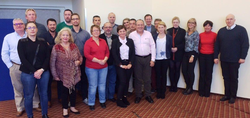  The
European works council of GeoPost met on 15 and 16 October 2015 in
Prague. The agenda included a communications training for the delegates
from nine countries organized by the EWC Academy. GeoPost is the second
largest parcel delivery provider in Europe and operates the parcel
division of French state-owned La Poste as DPDgroup. The EWC
was
established in May 2008 (see report in
EWC News 3/2008) and in 2013, signed a European
Social Charter with central management (see report in
EWC News 3/2013). The
European works council of GeoPost met on 15 and 16 October 2015 in
Prague. The agenda included a communications training for the delegates
from nine countries organized by the EWC Academy. GeoPost is the second
largest parcel delivery provider in Europe and operates the parcel
division of French state-owned La Poste as DPDgroup. The EWC
was
established in May 2008 (see report in
EWC News 3/2008) and in 2013, signed a European
Social Charter with central management (see report in
EWC News 3/2013). |
|
13.
Current seminar schedule
|
|
The EWC Academy and its
forerunner organization,
have been organizing and delivering conferences and seminars
for members of European works councils, SE works councils and
Special Negotiating Bodies since January 2009. So far, 625 employee
representatives from 236 companies have taken part, including many of
them for several times. This represents around 19% of all transnational
works councils in Europe. In addition there are numerous in-house
events and guest lectures organized elsewhere.
  Legal EWC workshop (only few places left) Legal EWC workshop (only few places left)From 28 to 30 October 2015 a seminar on EWC legislation is being held in the Harbour hotel Hamburg. On the agenda are the legal subtleties of a EWC agreement, past EWC case law and the application of the new EU standards in legal cases of doubt.
Data protection in the international company (only few places left) The global inter-connection of IT systems is becoming increasingly widespread. Employee data is processed on an international and corporate level. What possibilities do works councils have for controlling or limiting the transmission of data within the company? This is the subject matter of a seminar organized from 28 to 30 October 2015 in Hamburg.
8th Hamburg Conference for European and SE works councils   As
every year in January a two-day conference is being organized in
Hamburg. The topics: As
every year in January a two-day conference is being organized in
Hamburg. The topics:Monday, 25 January 2016: Current trends in the EWC landscape, legal problems and examples of EWC activities Tuesday, 26 January 2015: Short seminar on EU labour legislation or alternatively: Short seminar on EWC consultation procedure EWC seminar in Montabaur Castle (also suitable for SE works councils)   Our annual EWC seminar in
Montabaur
(half-way between Frankfurt and Cologne, nearby high-speed train
station) is being held from 29 March to 1 April 2016. The following
topics are proposed in parallel: Our annual EWC seminar in
Montabaur
(half-way between Frankfurt and Cologne, nearby high-speed train
station) is being held from 29 March to 1 April 2016. The following
topics are proposed in parallel:
Language courses: Business English for works council members
In-house events
Please find an overview of possible topics for in-house events below: |
|
14. Imprint
|
|
EWC News is published by:
EWC Academy GmbH Rödingsmarkt
52, D-20459 Hamburg
Authors collaborating on this issue: Werner Altmeyer, Katharina Barrie, Rita da Luz
Distributor of the German version: 20,188 readers Distributor of the English version: 3,435 readers Distributor of the French version: 3,354 readers
Newsletter archive: www.ewc-news.com
|





 The EWC initiation seminar is
being held in Montabaur from 29 March to 1 April 2016 (half-way between
Frankfurt and Cologne, with high-speed train station). It will also
cover different systems of labour relations in the most
important
EU-member states.
The EWC initiation seminar is
being held in Montabaur from 29 March to 1 April 2016 (half-way between
Frankfurt and Cologne, with high-speed train station). It will also
cover different systems of labour relations in the most
important
EU-member states.


